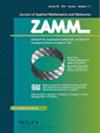Mathematical modelling for peristaltic flow of fourth‐grade nanoliquid with entropy generation
IF 3.2
4区 工程技术
Q1 MATHEMATICS, APPLIED
Zamm-zeitschrift Fur Angewandte Mathematik Und Mechanik
Pub Date : 2023-08-28
DOI:10.1002/zamm.202300034
引用次数: 3
Abstract
Nanomaterials having excellent thermal properties are employed in producing energy, extrusion processes, engineering processes, nuclear interactions, industrial domains and aero‐spaces, etc. Therefore, current study scrutinizes the aspects of entropy optimization and Ohmic heating on MHD peristalsis of fourth‐grade nanoliquid in a channel. Flexible channel walls retain concentration, thermal slip and velocity conditions. The consequences of viscous dissipation and Arrhenius activation have been accounted. The lubrication approximation is used in mathematical modelling. Nanofluid model is used by considering thermophoresis and Brownian motion. Furthermore, thermal radiation features are included in the energy equation. By using an appropriate similarity transformation, a system of PDEs is simplified to a solvable system of ODEs. Numerical techniques are used to solve the problem of governance. Detailed exploration of the sundry variables of concern on the flow quantities like velocity profile, nanoparticle concentration, temperature and entropy of the system is graphically examined. Heat transfer is examined in tabular form. Based on the derived outcomes, the velocity rises via thermal Grashof and slip variables. Further, an increment in Brownian motion and radiation parameters shows opposite behaviour on temperature.熵生成的四级纳米液体蠕动流动数学模型
纳米材料具有优异的热性能,被广泛应用于能源生产、挤压工艺、工程工艺、核相互作用、工业领域和航空航天等领域。因此,本研究从熵优化和欧姆加热两个方面对四级纳米液体在通道中的MHD蠕动进行了研究。柔性通道壁保留了浓度、热滑移和速度条件。计算了粘性耗散和阿累尼乌斯活化的结果。在数学建模中采用了润滑近似。采用纳米流体模型,考虑热泳动和布朗运动。此外,能量方程中还包含了热辐射特征。通过适当的相似变换,将偏微分方程系统简化为可解的偏微分方程系统。数值技术用于解决治理问题。详细探讨了各种变量对流量的关注,如速度剖面,纳米颗粒浓度,温度和系统的熵的图形检查。传热以表格形式进行检验。根据导出的结果,速度通过热格拉什和滑移变量上升。此外,布朗运动和辐射参数的增加对温度表现出相反的行为。
本文章由计算机程序翻译,如有差异,请以英文原文为准。
求助全文
约1分钟内获得全文
求助全文
来源期刊
CiteScore
3.30
自引率
8.70%
发文量
199
审稿时长
3.0 months
期刊介绍:
ZAMM is one of the oldest journals in the field of applied mathematics and mechanics and is read by scientists all over the world. The aim and scope of ZAMM is the publication of new results and review articles and information on applied mathematics (mainly numerical mathematics and various applications of analysis, in particular numerical aspects of differential and integral equations), on the entire field of theoretical and applied mechanics (solid mechanics, fluid mechanics, thermodynamics). ZAMM is also open to essential contributions on mathematics in industrial applications.

 求助内容:
求助内容: 应助结果提醒方式:
应助结果提醒方式:


